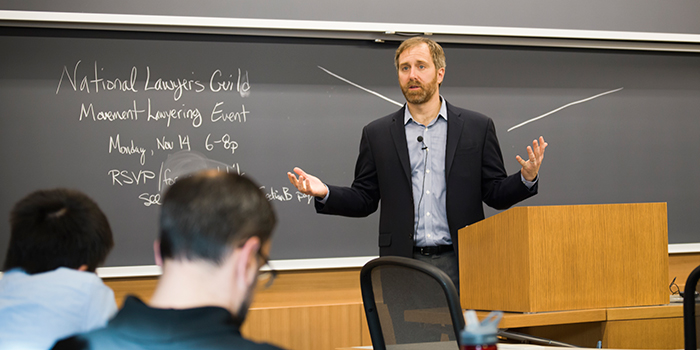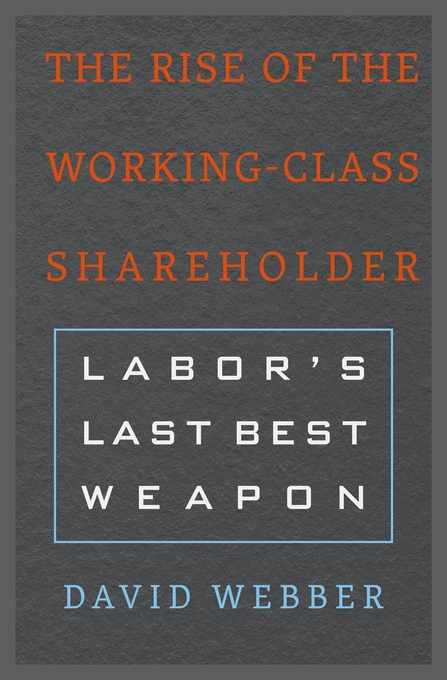Professor David Webber Uncovers the Untapped Power of the Working Class in New Book
The Rise of the Working-Class Shareholder: Labor’s Last Best Weapon unveils a new path for the modern worker.
 For Professor David Webber, unearthing shareholder power and its significance for the 21st century worker has been a career-long pursuit. His book, The Rise of the Working-Class Shareholder: Labor’s Last Best Weapon, published by Harvard University Press, was released in March 2018. The work synthesizes his research, practice, and experience uncovering the hidden strength of the modern laborer within the financial market.
For Professor David Webber, unearthing shareholder power and its significance for the 21st century worker has been a career-long pursuit. His book, The Rise of the Working-Class Shareholder: Labor’s Last Best Weapon, published by Harvard University Press, was released in March 2018. The work synthesizes his research, practice, and experience uncovering the hidden strength of the modern laborer within the financial market.
As a practicing attorney in New York, Webber saw firsthand how working-class pension funds were consistently the only investors to stand up and sue in the face of fraud or other corporate misbehavior. Much of his early research focused on studying how such pension funds used their shareholder power to police the market when no one else was willing to do so.
As he researched this phenomenon, Webber became fascinated with the activists who identified the potential for workers to use their shareholder power to protect their own interests. That spread beyond litigation to focus on a wide array of activism. With an estimated $3 to 6 trillion in pension funds alone, Webber asserts laborers can use that substantial power in their own favor.

“My book boils down to putting a spotlight on this invisible activism, that no one’s aware of, that’s so critically important,” he says.
Webber focuses on individual episodes of shareholder activism. Through these vignettes, he brings to light these activist fights, also addressing the legal and policy issues they raise.
While attending a pension fund trustee meeting for public pension trustees, Webber heard many complaints about how these funds were investing in ways that directly undermined their own workers’ interests. For example, firefighter pension funds were investing in their direct competition—private equity funds that run private firefighting companies.
Another critical example features a janitor whose pension contributions were invested in a company that later underbid his employers’ contract with the school district. His payments were used to fund the entity that took his $20/hour job. He was later offered the same job, but for only $8.50/hour.
Stories like these have prompted a push for collective action against unsavory and damaging pension fund investment.
“When their investor power is collectively managed through a pension fund, then that big pension fund, on behalf of workers, has a lot of clout,” he says.
Such sway can be used to the advantage of workers. By collectively pushing for better benefits and a stronger voice, these laborers can use their shareholder power to enact change.
Webber’s recent op-ed in The New York Times shares how investors are trying to stop that process. Through pension reform, traditional pension funds are being replaced by individual 401(k)s. Thus, by severing this source of united power, workers are losing their vehicle for collective action. He likens the scenario to the elimination of labor unions.
Watch: Professor David Webber discusses The Rise of the Working Class Shareholder: Labor’s Last Best Weapon
“A pension is like a union, and an individually managed 401(k) is like ‘right to work.’ When you break up collective pensions into millions of individual accounts, the shareholder power that arises from large collectively-managed pension funds mostly disappears.”
Webber hopes the book will inspire and inform workers on their capabilities with shareholder power. By documenting both the victories and failures of the movement, he provides a possible solution to the uncertain future of the modern-day laborer.
“Worker organizations in the country—unions, and other work organizations have, in some ways, unfortunately never faced a more bleak future—I think that my book comes along at a time to offer some new ways forward,” he says.
BU Law will host a symposium to celebrate The Rise of the Working Class Shareholder: Labor’s Last Best Weapon on April 9th at 12:45 PM at Barrister’s Hall.
Reported by Josee Matela (CAS/COM’20)
Related Stories
- A Symposium to celebrate The Rise of the Working Class Shareholder
- Professor David Webber Discusses Politics and Investment